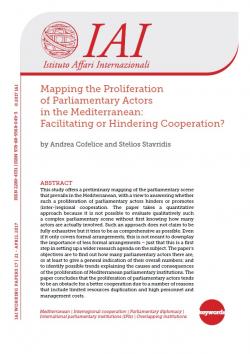Mapping the Proliferation of Parliamentary Actors in the Mediterranean: Facilitating or Hindering Cooperation?
This study offers a preliminary mapping of the parliamentary scene that prevails in the Mediterranean, with a view to answering whether such a proliferation of parliamentary actors hinders or promotes (inter-)regional cooperation. The paper takes a quantitative approach because it is not possible to evaluate qualitatively such a complex parliamentary scene without first knowing how many actors are actually involved. Such an approach does not claim to be fully exhaustive but it tries to be as comprehensive as possible. Even if it only covers formal arrangements, this is not meant to downplay the importance of less formal arrangements – just that this is a first step in setting up a wider research agenda on the subject. The paper’s objectives are to find out how many parliamentary actors there are, or at least to give a general indication of their overall numbers; and to identify possible trends explaining the causes and consequences of the proliferation of Mediterranean parliamentary institutions. The paper concludes that the proliferation of parliamentary actors tends to be an obstacle for a better cooperation due to a number of reasons that include limited resources, duplication and high personnel and management costs.
-
Details
Roma, IAI, April 2017, 27 p. -
Issue
17|21 -
ISBN/ISSN/DOI:
978-88-9368-049-3
Introduction
1. Parliaments and international affairs
2. Why the Mediterranean as a case study?
3. Mapping the Euro-Mediterranean parliamentary field
3.1 Parliamentary assemblies of States
3.2 International parliamentary entities including IPIs
Conclusions
References



